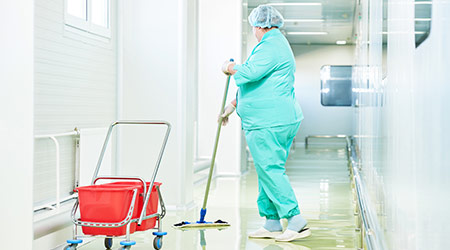
Disinfectants may be helping create superbugs
Research has led to calls for the products - Chlorhexidine and Mupirocin - to be more strictly regulated
Doctors have called for common hospital disinfectants to be regulated like antibiotics after studies suggest that the chemicals are helping create resistant superbugs, according to an article on The Herald website.
The researchers at Scotland's University of Aberdeen say that as many as 10 to 15 patients a month — in an average intensive care ward — are contracting infections linked to the overuse of disinfectants.
This has led to calls for the products - Chlorhexidine and Mupirocin - to be more strictly regulated.
The results suggest that healthcare facilities need to change the way they think about using disinfectants, particularly in the hospital setting. The research showed that in environments with a high concentration of disinfectant, previously harmless staphylococcus epidermidis bacteria can develop resistance to treatments commonly used to treat infection.
Despite the concerns over the use of the disinfectants, the researchers stops short of calling for hospitals to ban them.
March 25, 2019
Recent Posts
 Report Sheds Light on Cyberattack and Data Breach Trends from 2024
Report Sheds Light on Cyberattack and Data Breach Trends from 2024
Despite a slight decrease in data breaches from 2023, the volume of exposed data and records surged.
 Hampstead Hospital Officially Joins Dartmouth Health
Hampstead Hospital Officially Joins Dartmouth Health
This will make Dartmouth solely responsible for the clinical leadership, patient care and operation of Hampstead Hospital and Residential Treatment Facility.
 HCA Florida Healthcare Announces Plans for Three New Freestanding ERs
HCA Florida Healthcare Announces Plans for Three New Freestanding ERs
Construction is expected to begin on the three facilities in 2025, with completion anticipated in 2026.
 Barriers to Infection: Rethinking Mattress Cleaning
Barriers to Infection: Rethinking Mattress Cleaning
Laundering removable bed barriers provides a more effective, consistent and safer method for eliminating harmful bacteria compared to manual cleaning.
 Over 1 Million Individuals Affected in Community Health Center Data Breach
Over 1 Million Individuals Affected in Community Health Center Data Breach
No evidence of data misuse has been found so far.